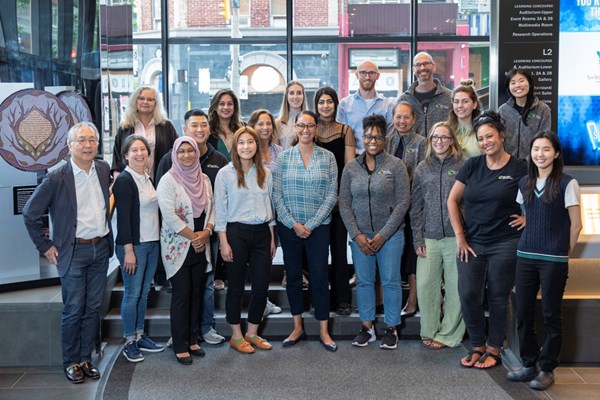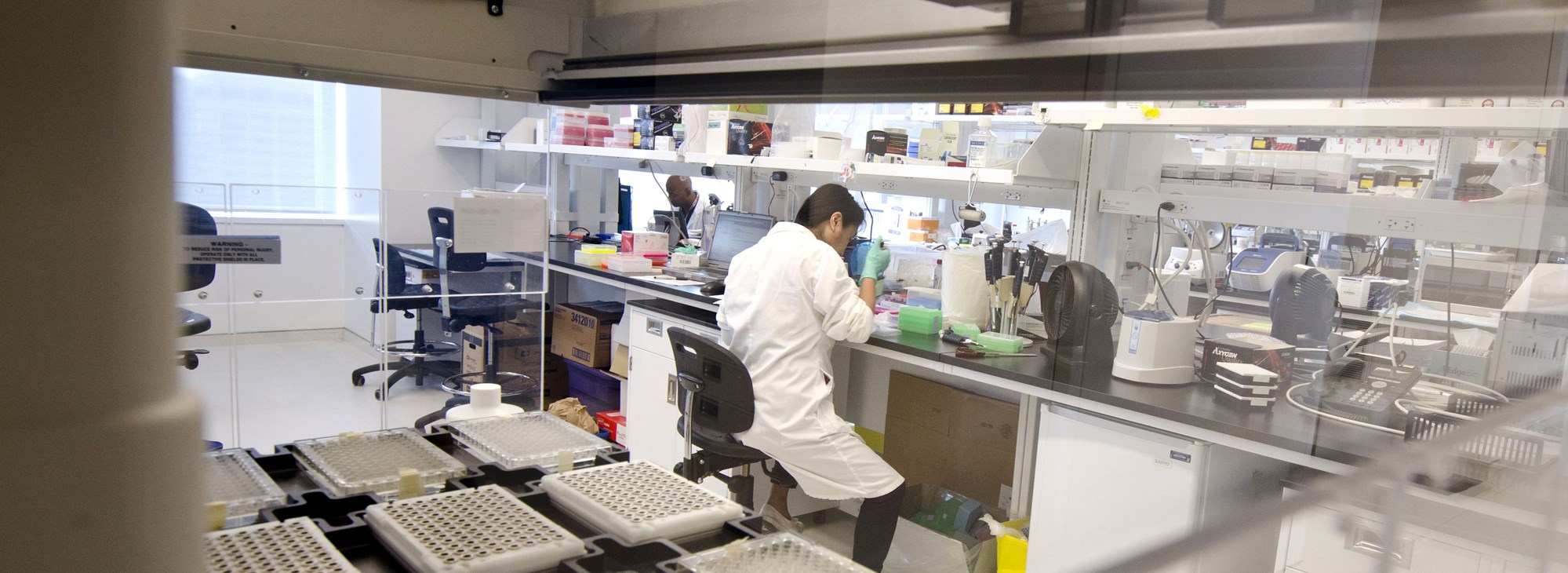Clinical Pharmacology & Toxicology

We focus on education, research and clinical care related to children’s medications, diagnoses and treatment of adverse effects.
Some of the conditions we research and clinically manage include unpredictable and variable drug response, side effects and toxicities of drugs, overdoses and poisoning and pharmacogenetics. Our clinical programs span wide areas ranging from the Clinical Pharmacology consultation service and clinic at SickKids, to the Ontario Poison Centre, which also serves other provinces in Canada.
We work to better understand and manage variable drug response and toxicity. Diagnosis and treatment of adverse drug reactions in children is complex. Some children are more susceptible to adverse events with drug treatment, because of age or polypharmacy or critical illness. Our clinical team helps SickKids clinicians investigate and understand adverse drug reactions in children.
When children do not respond to medications as expected, our clinical team helps assess if stage of development, genetic differences, problems with formulation / dosing or other factors are contributing. Some patient populations (e.g., neonates and infants) have had very little pharmacology research and are especially prone to inadequate medication response or high risk of drug toxicity.
Our expertise includes a broad range of medication- and toxin-related problems, which are often different from those seen in adults. While we capitalize on knowledge from adult pharmacology research and clinical practice, we also have a unique lens as paediatricians and are working to understand how infant and child pharmacology is unique.
We use important technology such as drug level measurements, pharmacogenetic testing, along with other information on individual susceptibility to drug toxicity or inadequate drug response. We interpret the results, taking into account other drugs the child is taking and their underlying diseases.
Our goal is to share clear understanding of the possible causes of their variable drug responses and toxicity, management plans and prevention strategies with the patients, their families and the clinical teams.
Precision therapeutics
Medication dosing recommendations are based on population-based studies, but there is variable clinical response to drug dosing in individual children. Precision therapeutics is an approach to drug dosing that accounts for individual characteristics including stage of development, weight, illness and other factors.
Recently, we have introduced pharmacogenomics to identify individuals at an elevated risk of drug toxicity or ineffectiveness. As one of the areas of precision medicine, pharmacogenomics allows us to decipher whether a patient has genetic changes in genes responsible for metabolism in response to medicine. If genetic changes are present, we can work with the family and the clinical team to modify medication treatment plans.
Our research programs also focus on a wide range of clinically important drug-related research questions including drug safety in children, drug metabolizing enzymes and their development, drug transporters, pharmacogenetics and the pharmacokinetics and pharmacodynamics of old and new drugs in children.
As the discipline of clinical pharmacology is growing in its scope, our current research methodologies include not only molecular-level pharmacology such as pharmacogenetics but also population-level pharmacology research using clinical epidemiology approaches. Our division has active research collaborations with multiple other specialties within the children’s hospital and internationally.
The DART clinic is an ambulatory clinic that receives referrals from health care providers of the patient. We see patients in our clinic or via virtual care. Our focus is on the following conditions:
- Drug hypersensitivity reactions (except for immediate type reactions)
- Environmental toxin exposures (for example, high levels of lead and mercury)
- Pediatric poisoning follow-up
- Pharmacogenetics test service, interpretation and therapy recommendation
Note that this clinic is a joint activity between our division and Allergy/Immunology. Referrals may be redirected to Allergy/Immunology if diagnoses of immediate type allergic reactions are required.
Visit the DART Clinic page for location and contact information.
Although situated at SickKids, the Ontario Poison Centre provides expert poison advice 24 hours a day to serve Ontario, Manitoba & Nunavut (health care professionals only) and provides care advice regarding pediatric, adolescent and adult (including seniors) poisonings. Assistance is provided to people of all ages for a wide variety of exposures. Examples include:
- A child who was found with an open household chemical
- A child who ate a plant
- A teenager who has been experimenting with street drugs or alcohol
- An adult who has been involved in an industrial chemical spill
- A senior who has made an error in their daily medicine routine
Of the 66,000 plus cases of exposures called through to the Poison Centre every year, almost 50 per cent are in regard to toddler exposures, the majority being preventable. Cases are followed to known outcome. As the clinical situation of a patient changes, treatment recommendations change. In total, another 54,000 follow-up calls are made annually making our Poison Centre the busiest in Canada.
Both the clinical service of the Clinical Pharmacology program and the Poison Centre provide a training opportunity for the Clinical Pharmacology/Toxicology Residency program at the University of Toronto, one of only three training sites in the country. Other toxicology elective opportunities are available for advanced physician trainees in the Poison Centre.
Our Poison Centre participates in outreach education at all levels from parents to continuing education for health care professionals. We have retrospective case review research and quality initiatives underway. We act as consultants for many levels of government regarding the opioid crisis, riot control and terrorism agents, in removing hazardous products from the marketplace, to name a few examples. We currently provide statistics for poisonings to the press, when appropriate, and to the federal government as part of Toxicovigilance Canada.
Family resources
The Ontario, Manitoba & Nunavut Poison Centres offers a variety of resources related to poison prevention:
- First Aid
- Over the counter medication safety
- Plant safety
- Poison proof your home
- Opioid resuscitation recommendations
Key staff
Division Head:
Tamorah Lewis, MD, PhD
Expand the section below for a list of key staff in our Clinical Pharmacology and Toxicology division at SickKids.
At SickKids:
- Division Staff
- Ruud Verstegen, MD, PhD
- Shinya Ito, MD, FRCPC
- Sabrina Boodhan, R.Ph., Hon.B.Sc., B.Sc.Phm., ACPR
- Han Byul Kang, PharmD, R.Ph., ACPR
- Iris Cohn, M.Sc., R.Ph. (pharmacogenetics)
- Sierra Scodellaro, M.H.Sc. (pharmacogenetics)
- April Kennedy, M.H.Sc. (pharmacogenetics)
Ontario, Manitoba & Nunavut Poison Centres:
- Medical Director, Margaret Thompson, MD, FRCPC
- Assistant Medical Director, Connie Mackenzie, MD, FRCPC
- Staff Toxicologist, Emily Austin, MD, FRCPC
Consultant Toxicologists:
- David N. Juurlink, MD, PhD, FRCPC, FAACT, FACMT
- Howard An, MD, FRCPC
- Alya Kamani, MD, FRCPC
- Kaitlynn Rigg, MD, FRCPC
- Chris Lazongas, MD, FRCPC
- Morgan Riggan, MD, FRCPC, FACMT
- Henry Svoboda, MD, FACEM, FACMT
- Ryan Chuang, MD, FACEM, FACMT
SickKids cross-appointees:
- Savithri Ratnapalan, MBBS, PhD, FRCP(UK), FRCP(C), FAAP
- Chris Parshuram, MB.ChB., D.Phil., FRACP
- Tom Leibson, MD
- Bonnie Stevens, PhD
- Anna Taddio, PhD
- Yaron Finkelstein, MD
Administrative support:
- Hila Halshtok - Administrative Coordinator for the Division of Clinical Pharmacology and Toxicology
- Donna Tedesco - Administrative Assistant to the Ontario, Manitoba & Nunavut Poison Centers

Research programs at Clinical Pharmacology and Toxicology focus on drug metabolizing enzymes and its regulation, drug transporters, mammary gland drug transport and metabolism, and drug safety in all children. This includes all disease conditions.
The intersection of developmental pharmacology and other influences on drug pharmacokinetics (PK) and pharmacodynamics (PD) are of great interest to our Division. We are using a combination of approaches to research optimal drug use in children, focusing on individualization of pharmacotherapy. For example, in pediatric sub-populations, PK models are built and validated and these PK models can be used to inform custom dosing strategies for patients. Other factors, such as polypharmacy, pediatric obesity and gut health / microbiome all play a role in optimal drug dosing in children. Our Division is interested in research collaborations that advance precision therapeutics in children.
Optimizing a system for drug study and labelling in children is an important goal. In collaboration with organizations such as the International Neonatal Consortium and Paediatric Trials Network, faculty in the Division are helping to create and validate tools that will advance drug labelling in children. Through collaboration with regulatory bodies such as the FDA and Health Canada, we are helping to advance regulatory policy and science for children.
This research focus is led by Shinya Ito and is closely tied with clinical activities. Studies include prospective cohort studies on drug safety during lactation.
With many new medications introduced in the market, or about to be introduced in the market, clinical data on safety and information on drug concentration in milk provide previous evidence for rationale therapeutics. Under the support from the Canadian Institutes of Health Research (CIHR), the “Drug in Lactation” Analysis Consortium (DLAC) has been developed as an infrastructure for milk sample collection, and at present, another CIHR-funded project, “Drug in Breast Milk”, is running.
With an updated list of target drugs, drug levels in milk are analyzed to estimate infant exposure levels through physiologically-based pharmacokinetic modeling analyses. Recently, we have been selected as one of the NIH-funded multicentre studies on drugs in breastfeeding.
The field of pharmacogenetics is expanding, but data remains relatively scarce for infants and children.
In addition to the nation-wide network for pharmacogenomics, we have been running a clinical implementation pilot study of paediatric pharmacogenomics service. This is to characterize practical hurdles in the implementation, and explore clinical values of the service.
Explore more research on pharmacogenetics at SickKids, and learn more about Dr. Ito’s Lab here.

Expand the sections below to learn about educational opportunities with Clinical Pharmacology and Toxicology at SickKids.
Our mandate is to train the next generation of pharmacologists and toxicologists who can contribute to safe and effective pharmacotherapy in paediatrics and further develop the discipline as a key component of clinical and academic medicine.
The University of Toronto Clinical Pharmacology and Toxicology Subspecialty Program is a Royal College of Physicians and Surgeons of Canada accredited two-year program, based at The Hospital for Sick Children (SickKids) and Sunnybrook Health Sciences Centre in Toronto.
We have a total of four Ministry-funded positions in the University over a two-year period and fellowship positions for advanced training are available. Further training is also possible, depending on the trainee's career plan. Eligible candidates may come either from paediatrics, internal medicine, anesthesia, psychiatry, or emergency medicine.
Our program is one of the few active clinical pharmacology programs in Canada, and the largest such residency program in North America.
In our program, the resident/fellow will train to become a consultant with a broad knowledge of human pharmacology, therapeutics, and toxicology, and special expertise in a specific area of pharmacotherapy. They participate in all levels of our clinical activities. We also put a strong emphasis on the development of research skills (clinical or basic). Graduates of the program have pursued careers in academia, government, industry, and private practice.
New regulations in the United States and Europe have begun to change the practices of paediatric drug trials. All paediatric subspecialties, as well as medicine subspecialties, deal with drug trials and the demand for expertise in clinical pharmacology has never been greater.
More information about our program and application inquiries:
Contact Name:
Jenny Hoang – Education Coordinator
Email: cpt.trainingprogram@sickkids.ca
One-month block elective opportunities exist in the Ontario, Manitoba & Nunavut Poison Centres.
For advanced trainees in Emergency Medicine, Pediatric Emergency Medicine, Critical Care Medicine, and other core residency programs, contact Donna Tedesco (donna.tedesco@sickkids.ca) if interested.
Contact Clinical Pharmacology & Toxicology
Office hours
8 a.m. to 4 p.m.
Address
Clinical Pharmacology and Toxicology
555 University Avenue
Toronto, Ontario
Canada
M5G 1X8
How to reach us:
Division Contact: Hila Halshtok
Phone: 416-813-7413
Fax: 416-813-7562
Email: hila.halshtok@sickkids.ca
Clinic Contact: Leah Moscato
Email: leah.moscato@sickkids.ca
Phone: 416-813-5312
Fax: 416-813-7562
Ontario, Manitoba & Nunavut Poison Centres
OPC Contact: Donna Tedesco
Email: donna.tedesco@sickkids.ca
Phone: 416-813-6437
Fax: 416-813-7489
Our history
The division was established in 1978 as one of the first Paediatric Clinical Pharmacology programs in North America. The initial focus on pharmacokinetics and diagnosis of drug hypersensitivity has been expanded in the late 1980s to drug safety during pregnancy and breastfeeding.
In addition to our pediatric pharmacology programs, the Division is a home to the Ontario, Manitoba & Nunavut Poison Centres (OPC), which provides expert poison advice 24 hours a day, seven days a week to the general public and health care professionals throughout Ontario, Manitoba and Nunavut.
Since 1977, OPC has been formally recognized by the provincial Ministry of Health of Ontario as a regional poison center. In 2005, OPC expanded its services to include the entire province with the closure of all remaining hospital and regional centers. Recently, the service also covers the province of Manitoba and Nunavut territory.
The last several years have seen substantial growth in the Division’s clinical activities. Most notably, the caseload at OPC has increased to more than 120,000 per year for the last several years. Similarly, our pharmacogenetics consultation has been growing in parallel to the emergence of the precision medicine initiative.

